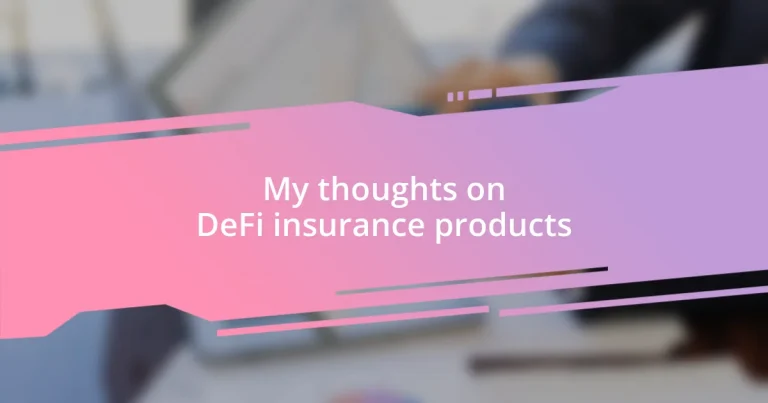Key takeaways:
- DeFi insurance enhances risk management in decentralized finance by providing tailored coverage, fast claims processing, and increased participation for risk-averse individuals.
- Key features include transparency via blockchain, decentralized governance allowing user input, and customizable policies designed for individual risk profiles.
- Future trends may focus on decentralized governance, AI integration in claims processes, and further customization of insurance policies to meet specific user needs.
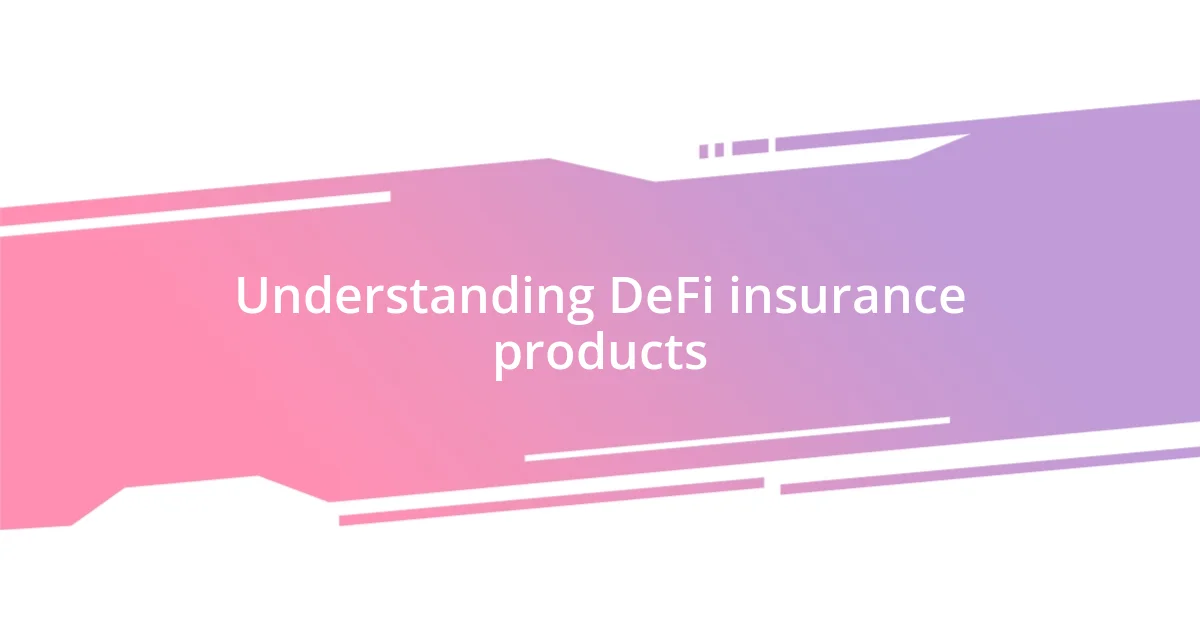
Understanding DeFi insurance products
DeFi insurance products represent a fascinating shift in how we think about risk management in the digital age. By utilizing smart contracts, these products aim to provide coverage against various vulnerabilities in decentralized finance, such as smart contract failures or hacks. I often find myself pondering—who wouldn’t feel a tad anxious about their assets when they’re sitting so exposed in the digital realm?
I remember a time when I made a small investment in a DeFi protocol without really considering the potential risks. As luck would have it, a major vulnerability was later discovered, and the entire platform was compromised. This moment of panic highlighted just how crucial it is to have a safety net in place. That’s where DeFi insurance steps in; it gives me peace of mind knowing that, should the unexpected occur, there’s a safety mechanism I can rely on.
Understanding these products isn’t just about the technicalities; it’s also about the peace of mind they can offer. These insurances can often feel complex, but at their core, they are about managing the uncertainties of this new financial landscape. Have you ever considered how much value you’d place on emotional security while making investments? For me, the potential to reclaim losses through DeFi insurance fundamentally transforms the investment experience into a more secure venture.
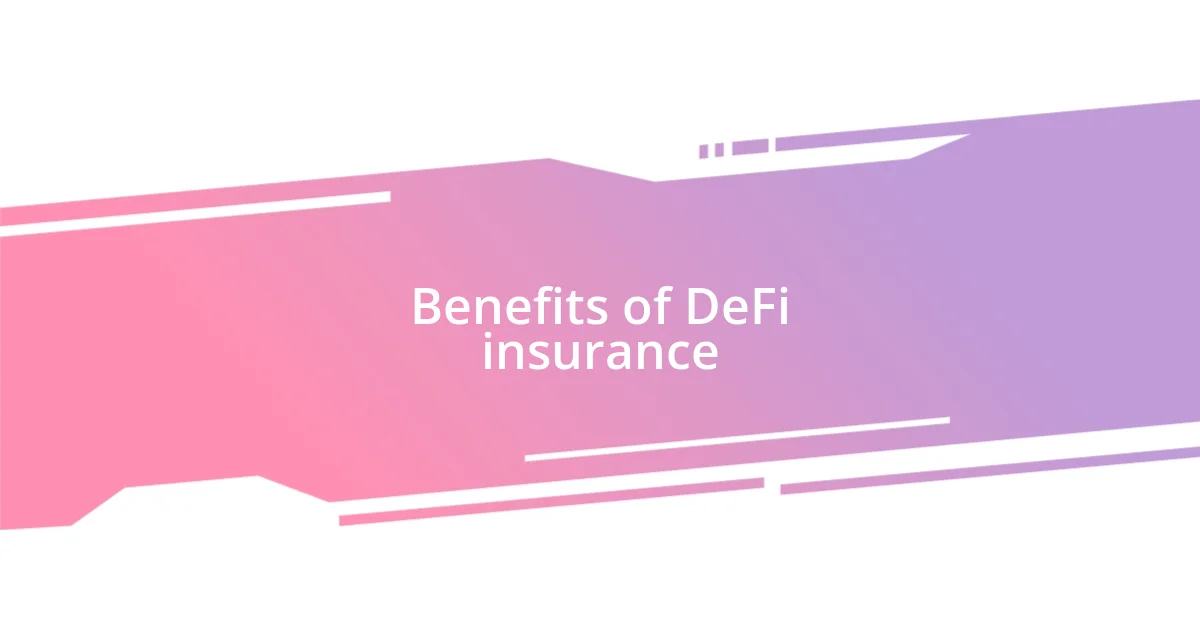
Benefits of DeFi insurance
DeFi insurance offers several compelling benefits that directly address the vulnerabilities faced by investors in decentralized finance. One major advantage is the ability to create customized coverage tailored to specific risks. For instance, the first time I dove into yield farming, I distinctly remember the overwhelming feeling of uncertainty surrounding possible exploits. Having the option to insure against such particular risks would have not only mitigated my anxiety but could have also made my investment decisions feel more deliberate.
Another significant benefit of DeFi insurance is the speed and efficiency with which claims can be processed. Since these products are built on smart contracts, the claims process can be considerably faster compared to traditional insurance approaches. I can’t help but think about a friend who faced a lengthy claims ordeal with a conventional insurer. If only they had the streamlined process offered by DeFi insurance—immediate payouts could have made all the difference during a financially stressful time.
Finally, DeFi insurance opens up avenues for broader participation in the crypto economy by lowering the entry barriers for risk-averse individuals. In my experience, many friends are hesitant to enter the DeFi space due to fears surrounding asset security. Introducing them to DeFi insurance would ease their worries, making them more inclined to explore the opportunities available without feeling overly exposed to the inherent risks of digital assets.
| Benefits of DeFi Insurance | Description |
|---|---|
| Customized Coverage | Tailored protection for specific risks like smart contract vulnerabilities. |
| Fast Claims Processing | Utilizes smart contracts for quicker resolution compared to traditional insurance. |
| Increased Participation | Encourages risk-averse individuals to explore DeFi opportunities with confidence. |
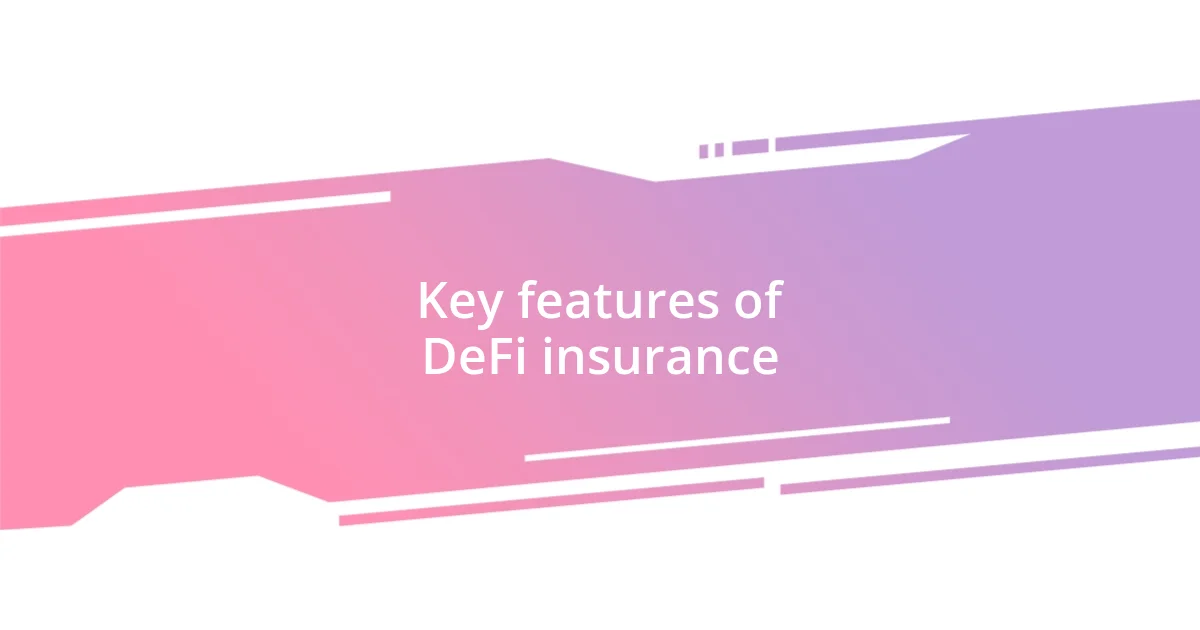
Key features of DeFi insurance
One of the standout features of DeFi insurance is its high degree of transparency, which I find incredibly important. Because everything is executed through smart contracts on the blockchain, policyholders can track their coverage and claims in real time. I vividly remember reading through traditional insurance policies feeling overwhelmed by fine print and hidden clauses. Knowing that with DeFi insurance, the terms are clear and accessible alleviates a lot of that stress.
Another compelling aspect is the opportunity for community participation in risk assessment. As someone who thrives on collaboration, I appreciate that these platforms often involve decentralized governance. Here’s a quick overview of key features that truly define DeFi insurance:
- Transparency: Real-time tracking through blockchain assures users of policy clarity.
- Decentralized Governance: Community-driven decision-making allows users to influence insurance protocols.
- Customizable Policies: Users can tailor coverage to fit their unique risk profiles, making every policy personal.
I recall feeling excited when I discovered that I could vote on policy parameters within a DeFi insurance platform. Participating in shaping the safety nets for our investments creates a sense of ownership. It’s an entirely different experience compared to the detached relationship many people have with traditional insurance.
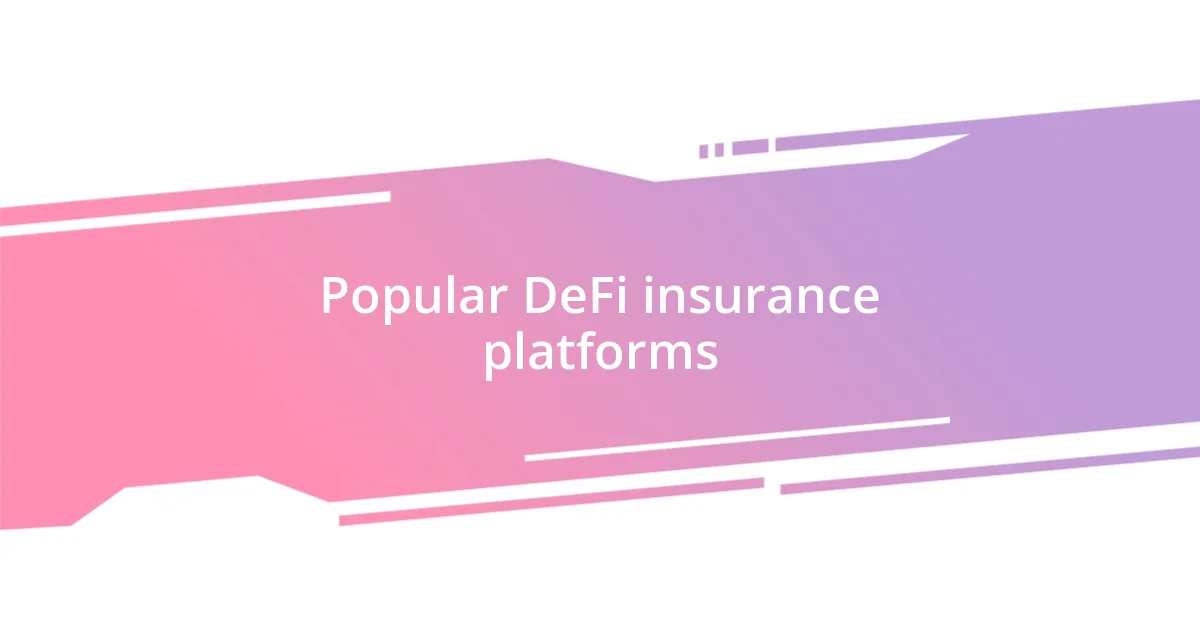
Popular DeFi insurance platforms
When it comes to popular DeFi insurance platforms, Nexus Mutual is a standout. I remember the first time I used it— navigating the interface felt like stepping into a more secure corner of DeFi. Their unique mutual model allows users to pool funds together, which means the community directly supports the claims process. It gave me a warm feeling knowing that we were all in it together, sharing risk rather than relying on an impersonal corporation.
Another platform that caught my eye is Cover Protocol. They stand out for their innovative approach to coverage. The ability to purchase coverage on specific smart contracts is a game-changer. I thought about all the times I hesitated to invest in a new protocol due to security fears. With Cover Protocol, I felt empowered to make those investments while having a safety net in place as a backup.
Then, there’s InsurAce, with its robust array of offerings across various DeFi protocols. I distinctly recall a conversation with a friend who was skeptical about the depth of their coverage options. After showing him InsurAce’s platform, complete with real-time insights and analytics, he quickly changed his tune. It was a reminder of the importance of educating others about the security options available in the DeFi space. Being able to lean on specific platforms like InsurAce not only reassures investors but also fosters a healthier, more engaged community.
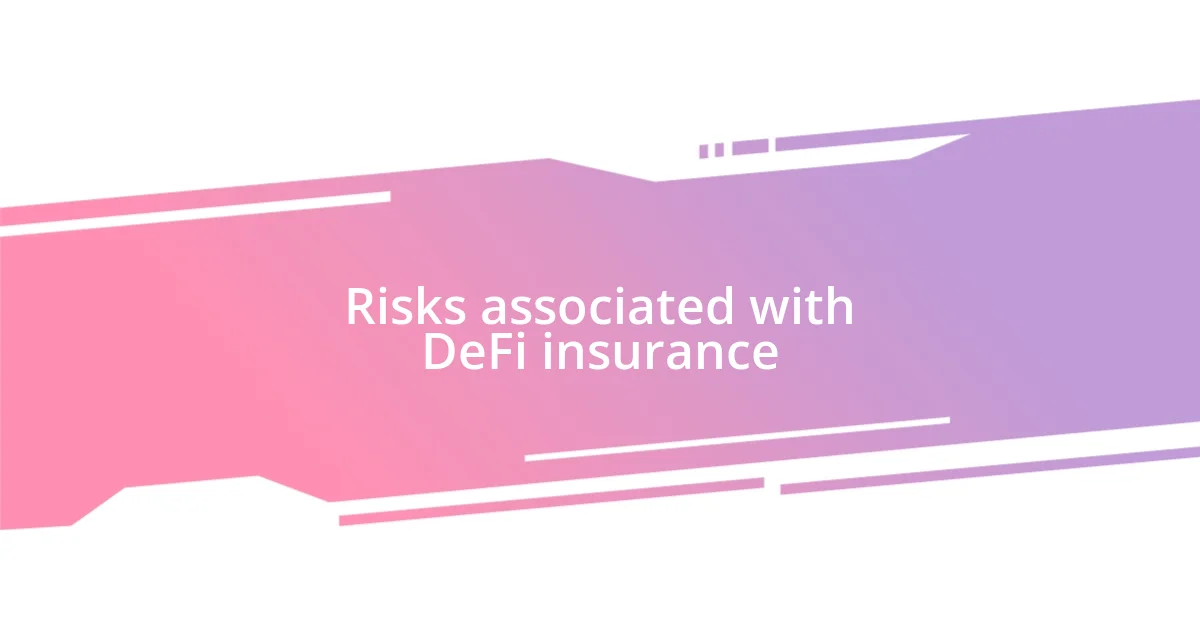
Risks associated with DeFi insurance
Navigating the risks associated with DeFi insurance can be quite daunting, something I’ve personally grappled with while exploring various platforms. One major risk is smart contract vulnerabilities, which can be a real headache. Imagine putting your faith in a system only to discover that a bug could leave your funds exposed. I remember when a prominent protocol experienced a hack; my heart sank as I thought about the potential impact on policyholders who thought they were covered.
Another risk that often comes to mind is the lack of regulation in the DeFi space. It’s easy to feel a sense of liberation when we talk about decentralized finance, but this freedom also means there’s a significant absence of oversight. I sometimes find myself questioning whether a platform will be there when I need it. What happens if a provider suddenly ceases operations? The thought sends shivers down my spine, reminding me of how fragile the ecosystem can be without those traditional safety nets.
The community-driven nature of DeFi insurance can also lead to challenges in claim settlements. While I appreciate the collaborative approach, I see how it can slow down the process of getting claims processed. I recall chatting with a friend who had to wait weeks for their claim due to disputes within the community. The emotional toll of uncertainty can be heavy; nobody wants to feel like they’re left hanging when the unexpected occurs. It makes you wonder—are we truly ready for this brave new world of insurance?
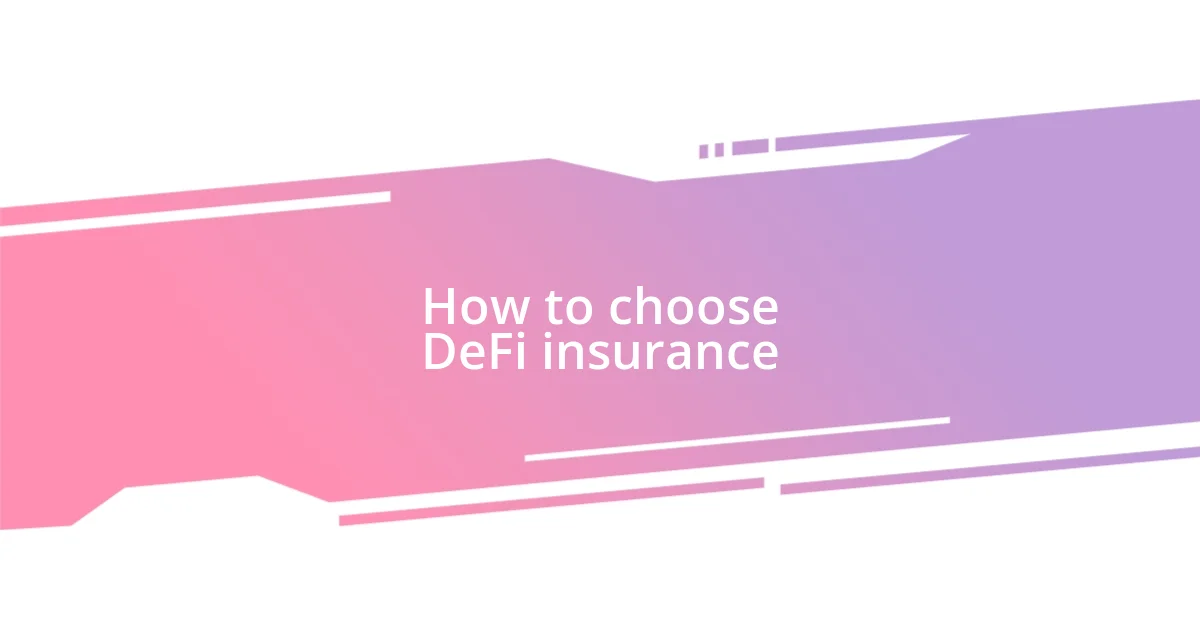
How to choose DeFi insurance
When I started exploring DeFi insurance options, I quickly realized that understanding what coverage you need is vital. For instance, I once chose a policy without fully grasping how it covered smart contract risks. It was a bit of a wake-up call when I realized some policies didn’t include the specific contracts I was investing in. Are you giving yourself enough time to really analyze your own needs before committing?
Another crucial aspect is researching the reputation of the platform. I learned this the hard way when I followed a buzz about a new provider, only to be left disappointed by vague terms and conditions later. Trust me, it’s worth taking the time to read reviews and community feedback. A platform that listens to its users fosters a sense of confidence that you can rarely put a price on.
Finally, give some thought to the claims process. My first encounter with filing a claim felt like trudging through molasses; I was anxious and uncertain about the outcome. I remember thinking, “Is this what I want to deal with when something goes wrong?” A clear, straightforward claims process should be a priority in your decision-making. How would you feel if every second mattered during a crisis?
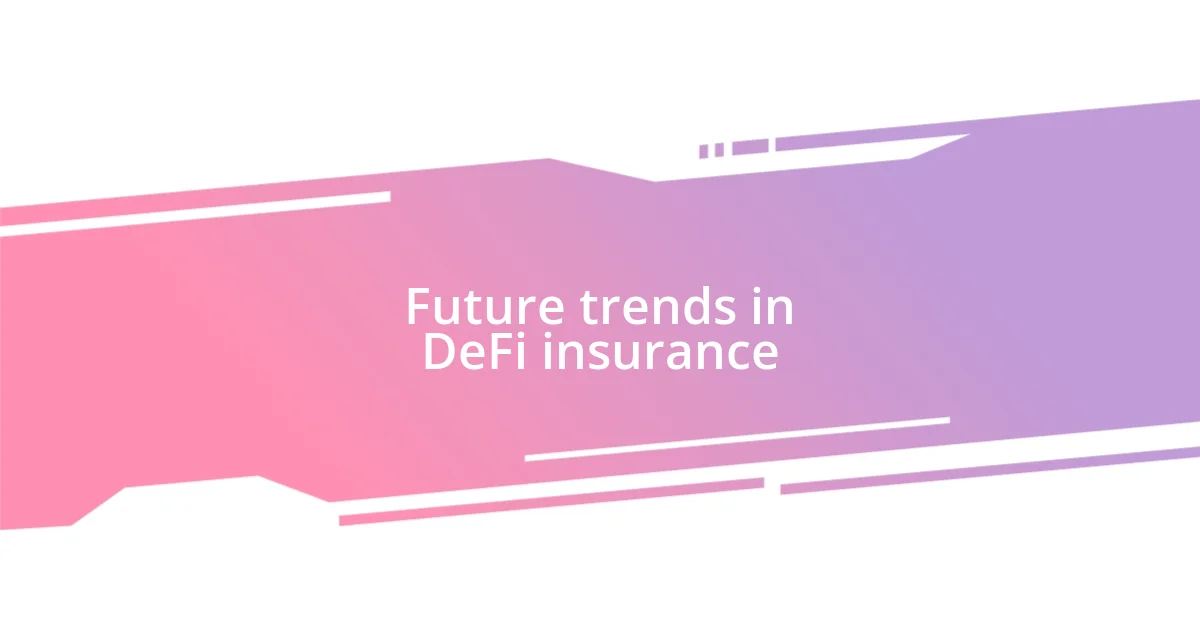
Future trends in DeFi insurance
As I glance toward the future of DeFi insurance, it’s clear that we will see an increased focus on decentralized governance. It’s an exciting shift that could empower users to take a more active role in the decision-making process. I often think about how this could change the landscape; will the community-driven approach lead to better transparency and trust? It’s a question worth pondering.
I’m also fascinated by the potential integration of artificial intelligence in underwriting and claims assessment. Consider my experience of waiting endlessly for claim approvals; I often wondered if technology could speed up that process. Imagine a world where AI can analyze claims efficiently, making decisions in real-time to alleviate the frustration so many of us have felt.
Finally, a growing trend is the customization of insurance policies to fit individual needs. This change could revolutionize how we approach coverage in this space. I can’t help but recall a time when I wished I could tailor my insurance to specific risks I faced. Wouldn’t it be incredible if we could finally invest in a policy designed just for us?












